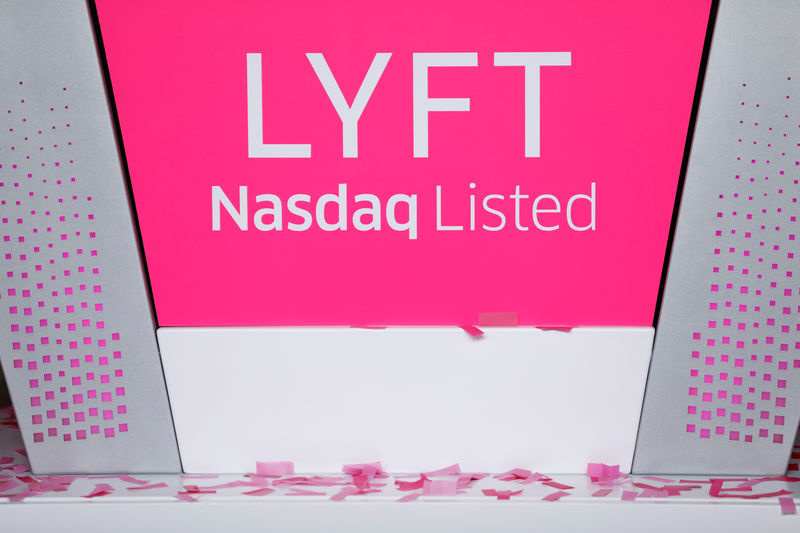By Sinéad Carew and Lance Tupper
NEW YORK (Reuters) - What a difference a week makes. Lyft Inc (NASDAQ:LYFT) has gone from IPO darling to short sellers' best friend.
Investors have ramped up bets against Lyft, which went public in an IPO priced on Thursday at the top of its already-elevated target range, even as borrowing fees became the most expensive in the market for shares in the ride-hailing service.
More than 38 percent of Lyft's 32.5 million publicly listed shares, valued at $856 million, were sold short by the end of Tuesday's session, according to data from S3 Partners. S3 did not disclose Wednesday's levels. Lyft raised $2.34 billion in its IPO.
In comparison, short-selling in Snap Inc (NYSE:SNAP), which was famously popular among shorts after its 2017 market debut, did not exceed 20 percent of its float until 10 weeks after its initial public offering.
After rising as much as 23% on Friday in its first trading day, Lyft finished up 8.7 percent. Ahead of the offering, Lyft, which has warned it may never be profitable, had faced criticism for its dual-class share structure and its strategy for autonomous driving. Investor worries also include new laws aimed at increasing driver pay.
On Monday, Lyft's second trading day, the stock opened lower and quickly lost ground, ending down 11.9 percent and below its $72 per share IPO price.
"The shorting started on Friday, but once the stock dropped 10% in the first 15 minutes of trading on Monday, it became a momentum and technical short because it was such a quick and savage move," said Ihor Dusaniwsky, head of predictive analytics at S3.
Investors who sell securities short borrow shares and then sell them, in a bet that the stock price will fall, allowing them to buy the shares back at a lower price, return them to the lender and pocket the difference.
Tuesday was the first day short sellers could borrow shares in Lyft, the same day the company received its first "sell" rating from Wall Street.
By Tuesday's close, the cost of borrowing Lyft stock had risen to 101.4 percent of the amount borrowed on an annualized basis, according to S3.
With a 39.9 percent borrow cost, MiMedx Group boasted the second biggest borrow fee for U.S. stocks with more than $50 million sold short, according to S3.
By Wednesday afternoon, borrowing fees for Lyft shares had more than halved, but it was the most expensive stock to short in that group.
Lyft's initial short interest outshone that of another recent market debutant, Levi Strauss (NYSE:LEVI), which went public on March 21. Short interest in Levi grew steadily for several days after the IPO but never reached the same level as Lyft's. By April 2 about 2.4 percent of Levi shares were sold short.
About 6.61 million Lyft shares with a market value of $455 million were reported as on-loan on Tuesday, according to IHS Markit Securities Finance issued on Wednesday. That firm sees borrowed shares as the best proxy for short selling.
"For Lyft to have that many shares on loan with that fee is notable," IHS Markit analyst Sam Pierson said. "For an IPO there's a lot of demand up front, but even within that framework this is fairly high."
Still, short sellers did not appear to be the dominant force on Wednesday. The stock closed at $70, after earlier touching its $72 IPO price. It remained well below $88.60, its highest price so far, which it hit during Friday's session.
Lyft shares pared gains on Wednesday after The Wall Street Journal reported that billionaire investor Carl Icahn sold his roughly 2.7 percent stake in Lyft ahead of the IPO.
Of the eight analysts who cover Lyft, three recommend buying the stock while four say to hold it, and one has a sell rating. The median price target for the stock is $77.50, a range of $42 to $97, according to Refinitiv data.
